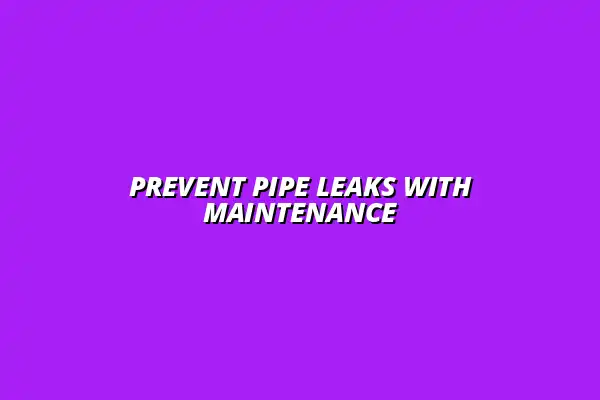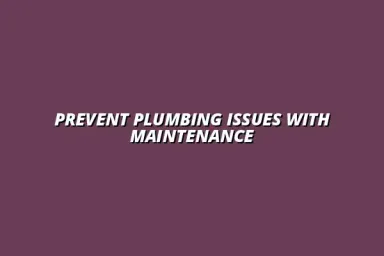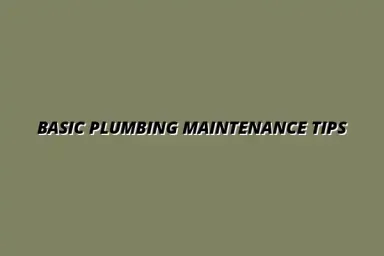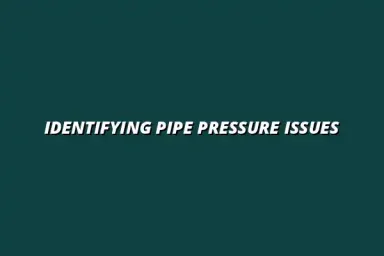Understanding Pipe Leaks and Their Causes
Pipe leaks can be a homeowner's nightmare. They can cause extensive damage, lead to high water bills, and create mold issues. Understanding the common causes of these leaks is crucial for prevention and early detection.
While some leaks are obvious, others develop silently over time. Being aware of the factors that contribute to pipe leaks can save you from costly repairs and headaches down the road. Let’s explore some common reasons for pipe leaks in homes.
Common Reasons for Pipe Leaks in Homes
One of the primary reasons for pipe leaks is corrosion. Over time, pipes made from metal can deteriorate due to rust and other environmental factors. This wear can create small holes that eventually lead to significant leaks.
Another common culprit is temperature changes. Pipes can expand and contract with shifts in temperature, which may lead to cracks or breaks, especially in colder climates. To prevent pipes from freezing and bursting in cold weather, check out these preventative maintenance tips. Let's take a closer look at the risks associated with these issues.
Corrosion and Aging Pipes: The Silent Dangers
Corrosion is a slow process that can go unnoticed until it causes trouble. It's often exacerbated by water quality, particularly if the water is acidic or contains high levels of minerals. Pipes that are over 50 years old are especially at risk! For advice on maintaining aging pipes, see these aging pipe maintenance tips.
- Signs of corrosion: Discoloration, rust spots, and leaks.
- Pipes most affected: Copper and galvanized steel.
- Prevention tips: Regular inspections and water quality tests.
Temperature Changes: How Weather Affects Pipes
Extreme temperature fluctuations can put stress on your plumbing. When temperatures drop, water inside pipes can freeze, expanding and potentially cracking the pipe. This can lead to leaks as soon as the ice melts.
To prevent this issue, ensure your pipes are well insulated, especially those located in unheated areas. Regular maintenance, as described in this guide to preventing plumbing repairs, can also help. Additionally, keeping your home at a consistent temperature during winter months can help!
Improper Installation: Risks of DIY Plumbing
DIY plumbing projects can sometimes lead to leaks if not done correctly. Common mistakes include using the wrong fittings, failing to secure joints properly, and not accounting for pipe expansion. These errors can lead to leaks that may not show up for a long time.
- Common DIY mistakes: Incorrect fittings, loose connections, inadequate sealing.
- Tips for safe installation: Always follow manufacturer guidelines and consult professionals when in doubt. If you need help, consider a professional plumber like those in Billesley, Birmingham.
The Importance of Regular Home Maintenance
Regular maintenance of your plumbing system is vital for preventing leaks. By staying on top of your home maintenance, you can spot potential issues before they escalate into significant problems. This not only saves you money but also protects your home’s value!
Let’s delve into how preventive measures can save you money over time and maintain your home's value effectively. Regular inspections are key to preventing leaks, as explained in this article on preventing plumbing leaks.
How Preventive Measures Save Money Over Time
Investing in regular maintenance can save you from costly repairs later on. By identifying and fixing small issues early, you avoid the need for extensive repairs caused by leaks or pipe failures.
- Cost-saving benefits: Lower water bills and reduced repair costs.
- Time savings: Fewer emergency calls and disruptions.
- Peace of mind: Keeping your home safe and functional.
Maintaining Home Value Through Effective Maintenance
Keeping your plumbing system in good shape is crucial for maintaining your home's overall value. A well-maintained home is more appealing to buyers and can command a higher price on the market.
Moreover, regular maintenance shows prospective buyers that you've taken good care of the property. This can make all the difference when it comes to selling your home in the future!
Addressing Common Questions About Pipe Maintenance
When it comes to maintaining your home’s plumbing, questions often arise. It's crucial to understand the signs that indicate potential pipe leaks, as well as when to seek professional help. By addressing these common questions, homeowners can take proactive steps to protect their plumbing systems and home overall.
Many people wonder how to spot a leak before it becomes a serious problem. Learning how to detect hidden pipe leaks is crucial for early intervention. By knowing the early warning signs, you can potentially save yourself from costly repairs.
What Are the Early Warning Signs of Pipe Leaks?
Identifying leak symptoms can help you tackle plumbing issues before they escalate. Here are some common early warning signs of pipe leaks to watch for:
- Unexplained increases in your water bill
- Water stains on walls or ceilings
- Unpleasant odors that may suggest mold
- Damp spots around your home
- Sounds of dripping water when the faucets are off
If you notice any of these signs, it's essential to take action. Knowing when to call a professional can make a difference in preventing further damage. If the symptoms persist or worsen, don’t hesitate to reach out to a plumber for assessment!
Identifying Leak Symptoms in Your Home
To effectively identify leak symptoms, I recommend a thorough inspection of your home’s plumbing. Don't forget about essential bathroom plumbing maintenance, as detailed in this article on bathroom plumbing maintenance. Look for:
- Frequent pooling water near appliances
- Cracks or warping in the foundation
- Rusty spots on pipes
Keeping an eye out for these indicators can help catch problems early. A proactive approach not only protects your home but can also save you money in repairs!
When to Call a Professional for Pipe Issues
It’s essential to know when to seek help from a plumbing expert. If you experience any of the following conditions, it’s time to call in the pros:
- Visible damage to plumbing fixtures
- Significant water damage that you can't contain
- Persistent leaks despite DIY efforts
- Water pressure issues
Addressing these situations promptly will help prevent further complications, such as mold growth or structural damage. Don't wait too long — it's better to be safe than sorry!
How Often Should Homeowners Schedule Plumbing Inspections?
Regular plumbing inspections are crucial to ensuring your home's pipes remain in good condition. Many homeowners wonder how often they should schedule these checks. Here’s a simple guideline:
- Annual inspections for homes older than 10 years
- Every two years for newer homes
- After major renovations or extreme weather events
By adhering to these timelines, you can help catch potential issues before they turn into costly repairs. Consistent inspections make a significant difference in maintaining the integrity of your plumbing system!
Creating a Maintenance Schedule for Your Home
Creating a maintenance schedule can help you stay organized. Here’s how you can set it up:
- Choose specific months for inspections
- Note seasonal changes that could affect plumbing
- Include reminders for checking water pressure and insulation
By implementing a clear maintenance schedule, you can ensure that you don't overlook essential checks. A well-planned schedule can make maintaining your plumbing system much easier!
Factors Influencing Inspection Frequency
Several factors can influence how often you should schedule plumbing inspections. Consider the following:
- Age of your home and plumbing system
- Local climate and weather patterns
- Type of plumbing materials used
- Any previous plumbing issues
By taking these factors into account, you can create a tailored maintenance plan that meets your home’s unique needs. Adjustments may be necessary over time to ensure optimal performance!
Final Thoughts on Preventing Pipe Leaks
Taking a proactive approach to pipe maintenance is essential for every homeowner. Integrating regular inspections and preventative measures into your home routine can greatly reduce the likelihood of leaks.
Staying informed and aware of your plumbing system's condition gives you a sense of control. This empowers you to make necessary changes that will protect your home for years to come.
Integrating Regular Maintenance into Your Home Routine
Creating a consistent routine for home maintenance is beneficial. Here are some strategies to help you establish this:
- Set reminders for regular inspections
- Involve family members in maintenance tasks
- Check plumbing systems during seasonal clean-ups
By incorporating these practices, you'll develop a proactive mindset towards home care. Staying vigilant can lead to significant long-term savings and peace of mind!
Developing a Proactive Mindset for Home Care
Having a proactive approach means staying one step ahead of potential issues. This includes:
- Educating yourself about common plumbing problems
- Regularly checking visible pipes and fixtures
- Addressing small issues before they escalate
With this mindset, you can significantly reduce the risks associated with pipe leaks and ensure a safe, comfortable living environment!
Utilizing Technology for Home Maintenance Reminders
Technology can help streamline your maintenance routine. Consider using:
- Mobile apps for home maintenance tracking
- Digital calendars with reminders
- Smart home devices that monitor water usage
These tools not only keep you organized but also provide timely alerts for necessary inspections. Embracing technology can enhance your overall home maintenance experience!
Encouraging Professional Help When Necessary
Sometimes, despite our best efforts, professional assistance is necessary. Knowing when to reach out for help is crucial in maintaining your plumbing system.
Professional plumbers bring expertise and knowledge that can save you time and resources. They’re equipped to handle complex issues that may be beyond DIY capabilities!
Finding Reliable Plumbing Services for Your Home Needs
Finding trustworthy plumbing services is essential for effective maintenance. Here are some steps to take:
- Ask for recommendations from friends and family
- Check online reviews and ratings
- Verify qualifications and licenses
By following these steps, you can locate reliable plumbers who will provide quality service and peace of mind. Trusting a professional can make a significant difference in your home’s plumbing health!
Understanding the Benefits of Professional Assessments
Professional assessments offer numerous benefits, including:
- Thorough inspections that identify hidden issues
- Expert advice on maintenance and repairs
- Access to advanced tools and technology
Utilizing professional services can ensure that your plumbing systems remain in top shape. Regular assessments not only address current concerns but also help prevent future problems!

 Kiran Almasi
Kiran Almasi

